After the tragic events in Las Vegas on Sunday night, news outlets are scrambling to understand the shooter’s motives, and how he managed to get access to an arsenal of firearms. In many states in the Southwestern US, state gun possession laws are very relaxed. Nevada and Utah have some of the most relaxed gun laws in the country, and many have already pointed out that Nevada’s gun laws often allow people to own machine guns and to carry concealed firearms.
If you live in Utah, it is important to understand your state’s gun laws and what constitutes a weapons crime. These laws heavily influence the risks associated with firearms, and when you could be charged with a crime for gun possession. Salt Lake City criminal defense lawyer Darwin Overson of Overson Law explains:
Gun Laws in Las Vegas and Salt Lake City
The shooting that occurred on Sunday was perpetrated by one individual. Police found him in his hotel room, soon after he took his own life, surrounded by at least 23 firearms. These guns were a combination of handguns and rifles. Despite reports that the gunfire came quickly in succession, reports have not confirmed that any of the weapons were fully-automatic. However, many of the guns that the shooter carried were high-power rifles, capable of firing long-range rounds that can pierce cover and body armor. Many of the guns were also equipped with scopes and high-capacity magazines.
In the state of Nevada, gun laws are quite relaxed. An individual who passes the proper background checks can buy virtually any gun they want. There are no state licensing requirements or permits for handguns or rifles. Even more clearly offensive weapons like .50-caliber rifles and fully-automatic weapons are legal if you follow federal registration and permit rules.
In Utah, gun laws are historically very open, allowing many to carry guns freely – but there are limits. To enforce a level of safety, Utah’s gun laws limit the state in which you may carry a gun.

Unless you are in your own home, business, or car, you may never carry a gun in a ready-to-fire state. That means that for someone who is not hunting, at a gun range, or actively using the gun in self-defense, there can be no rounds in the chamber. You may open carry both unchambered rifles and handguns. However, concealed carry is only permitted with a conceal-carry permit, even if the gun is unloaded.
Machine guns, sawed-off shotguns, and other weapons are also legal in the state of Utah. Some of these guns are subject to federal law enforcement. The US government has its own rules that blanket the entire country, and require registration, background checks, and licensing to own fully-automatic weapons.
Modified Firearms and High-Capacity Assault Weapon Laws in Utah
some weapons used or possessed by the Las Vegas shooter were what are often known as “assault weapons.” The term “assault weapons” is often politicized, but primarily covers weapons that have a military style, and appear to be for offense, rather than for hunting or self-defense. The typical example of an assault weapon is the AR-15, a semi-automatic, gas operated rifle with many physical similarities and similar power to some military weapons.
Across the country, it is illegal to own a fully-automatic weapon without following federal licensing requirements. This means that most of the legally-purchased weapons used in violent crimes and attacks, including the Las Vegas shooting, are semi-automatic weapons. A semi-automatic weapon produces one bullet each time the trigger is pulled (or sometimes fires a burst of bullets). Holding down the trigger will not fire additional rounds. In contrast, a fully-automatic weapon will continue to fire as long as the trigger is held down, until the magazine is empty.
However, news reports suggest that the shooter in Las Vegas was firing very quickly. The ATF has since confirmed that he used a modified weapon capable of firing nearly as fast as a fully-automatic weapon, even though the gun itself is still semi-automatic. Many of these modification devices fall into two categories: trigger cranks and “bump” stocks. A trigger crank is a device that attaches to the weapon’s trigger, and the operator uses a cranking motion to fire instead of pulling the trigger. The device depresses the trigger faster than a human usually could, allowing for rapid fire. A bump stock, which the shooter used, transfers the recoil back to the trigger, similarly allowing for faster firing on a semi-automatic weapon.

These modifications, scopes, and higher capacity magazines are partly what allowed one individual to fire hundreds of rounds into a crowd on Sunday night. Utah law makes no mention of restrictions on many of these items, and many of these modifications can be found for purchase on the Internet, even by those otherwise restricted from carrying a weapon, like children, felons, and those with a history of mental illness.
Salt Lake City Gun Crimes Attorney
Darwin Overson of Overson Law has practiced criminal law in Salt Lake City for nearly 20 years. For information regarding criminal charges, or for a free consultation on your criminal charges in Salt Lake City, contact our law offices today at (801) 758-2287.
Since the police bodycam footage of the July 26th incident at a Salt Lake City hospital showing a police officer arresting a nurse has come forward, news outlets and social media posts have been discussing the laws surrounding consent for blood draws and police brutality. Though Utah is one of the states with the lowest incidence of police brutality and police shootings, these events do happen. It is important to know the law – and your rights – whether you are a nurse or you’ve been charged with driving under the influence (DUI).
If you were charged with a crime like DUI and were forced to undergo a blood test, talk to an attorney. Salt Lake City DUI defense lawyer Darwin Overson understands the nuances of Utah’s DUI laws and may be able to help you if you were charged with a crime involving your blood results. If you were accused of DUI or obstruction of justice crimes, talk to an attorney today.
Utah Blood Draw Laws
In Utah, and everywhere else in the United States, police must have probable cause to draw blood from someone without their permission. In the past, “implied consent” laws allowed police to draw blood from someone under the theory that, in exchange for the right to drive their car in the state, they give the state permission to draw blood if they are ever suspected of DUI. That logic, though a bit confusing, stood for a long time as the standard rule in Utah and other states. However, as of the Supreme Court’s decision in Birchfield v. North Dakota on June 23rd, 2016, police across the nation must now get a search warrant for a blood test.
Search warrants are court orders issued to force suspects and others to comply with police investigations. This may mean allowing them to search their house, arrest them, or even draw and test their blood. Any time the police perform a “search,” they are required to have a search warrant – with some exceptions. A search warrant is only issued if the judge believes there is “probable cause” to search or seize the items or people in question. Probable cause means that it is likely that there is evidence of a crime to be found in that location (for a search warrant), or that the person to be arrested likely committed a crime (for an arrest warrant).

There are some exceptions to when a search warrant is needed. In cases where the evidence is moveable (such as a car), the police are in hot pursuit (such as chasing a suspect into their house), or evidence may be destroyed (such as flushed drugs or shredded documents), police may enter a home or search for and seize evidence without getting a warrant. There are other exceptions and “exigencies” that also allow police to forgo a warrant.
In any case, whether there is a warrant or not, police must have probable cause to perform a search or seizure. While the Fourth Amendment of the US Constitution creates the warrant requirement, court decisions have upheld these exceptions. However, the absolute minimum requirement for any search is probable cause.
In Birchfield, the US Supreme Court looked at a few different DUI cases, and decided that blood and breath tests are searches. That means that they are required to follow the rules of any other search:
- Police must have probable cause to perform the search, and
- Police must get a search warrant unless an exception applies.
The Court did decide that breath tests can be performed as part of an arrest, along with other searches that typically occur at that time. For blood tests, however, the Court decided police need a separate search warrant.
Of course, someone under investigation can always agree to a search. If the subject consents to a search of their person, car, home, or even to a blood draw, police can perform that search. This means that police can always legally draw blood if they get your permission first.

Utah Blood Warrant Rules in Nurse’s Arrest
In the July 26th incident, it appears that police were trying to get blood drawn from an unconscious man who was involved in a car accident. Allegedly, police were trying to prove he was not driving under the influence when they requested the blood draw. Since the man was unconscious, he could not consent. Since the man was not under investigation for DUI (and they were actually trying to prove he did not commit a crime), police had no probable cause and would have been unable to get a search warrant.
Nurse Alex Wubbels showed a great deal of courage in refusing the police request to draw blood, and helped ensure that the patient’s rights were upheld. Since this blood draw would have violated the patient’s constitutional rights, Utah law, hospital policy, and patients’ rights, she refused to draw blood for the police officers. Aside from these laws, nurses are held to ethical codes of conduct that require “informed consent” for any procedure. In the case of medical emergencies, doctors and nurses may be able to help injured individuals – but for blood to be handed over to police without patient consent or a search warrant would violate the patient’s rights. This shows that, even if police and courts may not be willing to uphold a patient’s rights, nurses and healthcare providers may be.
Can a Nurse be Charged with Obstruction for Refusing to Draw Blood after a DUI?
The nurse’s arrest clearly overstepped the police officer’s authority. By all legal principals, hospital policy, and police rules, the officer in this case overstepped his authority by arresting this nurse. Since she was not charged with any crime and was released after the arrest, it becomes clear that she didn’t do anything wrong.
In order to be charged with obstruction of justice or a similar crime in Utah, you must prevent the discovery of evidence “by force, intimidation, or deception,” and must have the “intent to hinder, delay, or prevent” investigation, arrest, or punishment. These requirements are clear under Utah Code § 76-8-305.5.
Under situations like Nurse Wubbels’, there should be no fear of being arrested or charged with a crime. The key point is the intent. In a situation where a nurse refuses to draw blood based on the legal standards, the nurse is not trying “to hinder, delay, or prevent” the investigation – they are working to uphold the law, hospital policy, and other rights and rules.
Salt Lake City Criminal Defense Lawyers
Darwin Overson of Overson Law is a Salt Lake City criminal defense lawyer who can help you. If you or a loved one was charged with a crime in Salt Lake County, call our law offices today for a free consultation on your case. If you were charged with a crime that involved a blood draw at a hospital, our attorneys may be able to fight the evidence if it was illegally seized. For your free consultation, call (801) 758-2287 today.
After an aggravated assault conviction was thrown out on a technicality, Utah legislators moved to reexamine the state’s current legal definition of aggravated assault, with a focus on whether attempted strangulation — the act of trying to choke a victim – should be included. If the bill passes and the legal definition of aggravated assault in Utah is expanded to include attempted strangulation, choking attempts will become a third degree felony.
Aggravated Assault Conviction Thrown Out Due to Incorrect Jury Instructions
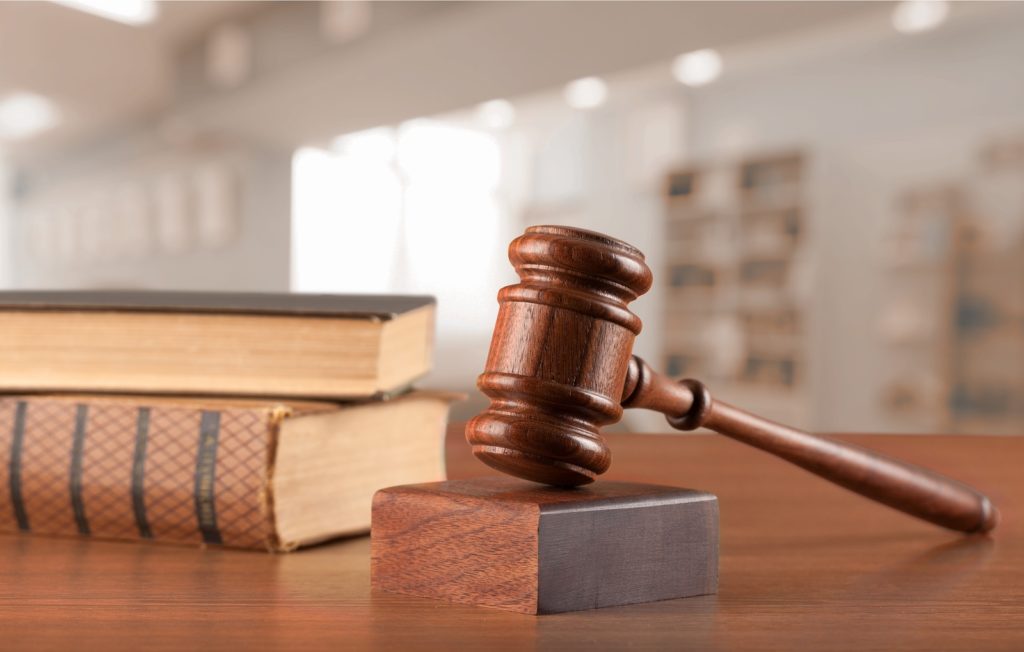
Recently a Salt Lake jury found defendant Timothy Walker guilty of aggravated assault in the attempted strangulation of his wife.
However, in State v. Walker (2017), an appeals court vacated the conviction and ordered a new trial after determining that Walker’s Sixth Amendment and Fourteenth Amendment rights had been violated because the instructions given to the jury “relieved the State of its burden of proving, beyond a reasonable doubt, the facts necessary to establish every element of the crime for which Walker was convicted.”
In other words, the jury instructions failed to correctly define what does and doesn’t constitute aggravated assault.
How Does Utah Define Aggravated Assault?
The “element[s] of the crime” refer to the different components, or elements, of the legal definition of aggravated assault, which is located at Utah Code § 76-5-103. This statute establishes the following as the elements of the crime of aggravated assault, meaning a defendant can only be convicted of aggravated assault if, to begin with, one of the following statements is true and provable beyond a reasonable doubt:
- The defendant attempts to cause bodily injury, and acts “with unlawful force or violence.”
- The defendant threatens to cause bodily injury, and the threat is “accompanied by a show of immediate force or violence.”
- The defendant commits an act that either causes injury or creates a serious risk of injury, and uses “unlawful force or violence” in committing that act.
Next, in addition to proving that one of the aforementioned scenarios occurred beyond a reasonable doubt, the prosecutor must also be able to prove that the defendant’s actions either included the use of:
- A dangerous weapon, such as a knife, bat, or gun.
- This can also lead to a weapons possession charge. You should contact a Salt Lake City weapons crime lawyer or Salt Lake City Airport gun possession lawyer if you have been charged with a firearms-related offense.
- Any “other means or force likely to produce death or serious bodily injury.”
- Importantly, “serious bodily injury” is legally defined in Utah as “injury that creates or causes serious permanent disfigurement, protracted loss or impairment of the function of any bodily member or organ, or creates a substantial risk of death.”
These are the elements of the offense of aggravated assault in Utah.
Bill Would Increase Penalties for Attempted Strangulation in Utah

If the bill succeeds, choking another person would be added to the existing definition of aggravated assault. This would enable prosecutors to charge defendants, if they allegedly attempted to strangle someone, with a third degree felony, which is punishable by a fine of up to $5,000, as well as a prison sentence of up to five years.
If the victim loses consciousness as a result of being choked, the bill would make the crime a second degree felony, punishable by a fine of up to $10,000 and a prison sentence of up to 15 years in prison — a maximum sentence triple that potentially imposed for a third degree felony.
In short, the bill seeks to broaden the definition of aggravated assault while increasing the current penalties for attempted strangulation, which is frequently treated as a misdemeanor due to the nature of the resulting injuries. According to a statement from the legislative committee chairman for the Utah Association of Criminal Defense Lawyers, the bill would make it “easier for prosecutors to convict people” because prosecutors “won’t have to rely on experts or won’t have to prove that it causes serious bodily injury.”
Salt Lake City Defense Lawyer Handling Assault and Domestic Violence Charges
If you or one of your family members has been charged with aggravated assault or simple assault in Utah, you could be facing prison or jail time in addition to costly fines that can add up to thousands of dollars. It is vital that you are represented by an experienced defense attorney who understands how to strategically handle an assault charge involved allegations of attempted strangulation.
Salt Lake City domestic violence lawyer Darwin Overson has over 16 years of experience representing defendants charged with felonies and misdemeanors in justice courts and district courts throughout the state of Utah. Darwin Overson handles criminal cases arising from assault arrests in Salt Lake City, Sandy, South Jordan, West Jordan, West Valley City, Provo, Bountiful, Layton, Cottonwood Heights, Ogden, Cedar City, Tooele, Lehi, and more. He is also able to make emergency visits to county jails and detention centers throughout the state.
Don’t wait to start exploring your legal options with an experienced Salt Lake City assault lawyer if you or a loved one is facing these charges or has been charged with another violent crime in Utah. Contact the law offices of Overson Law at (801) 758-2287 as soon as possible for a free and completely confidential legal consultation.
The Utah House Law Enforcement and Criminal Justice Committee recently voted in favor of recommending a bill that would broaden Utah’s existing “Stand Your Ground” laws or self-defense laws by explicitly establishing the right to defend against an attacker “even if safety could be achieved by retreating.” If passed, the bill could affect a number of defendants charged with violent crimes in Utah by establishing a new rule that “the failure to retreat may not be introduced as evidence” in criminal cases.
Utah Self-Defense Bill Would Ban Using Failure to Retreat as Evidence Against Defendants

Earlier this month, the Utah House Law Enforcement and Criminal Justice Committee voted 6-4 in favor of recommending HB259, which seeks to expand Utah’s existing self-defense laws. The bill, sponsored by Rep. Cory Maloy (R-Lehi), aims to alter the wording of the Utah self-defense statute, Utah Code § 76-2-402, to include language specifying that people are not required to retreat “even if safety could be achieved by retreating.”
At present, the statute states, under Utah Code § 76-2-402(1)(b), “A person is justified in using force intended or likely to cause death or serious bodily injury only if the person reasonably believes that force is necessary to prevent death or serious bodily injury” to themselves or another person:
- Due to an attacker’s use of force.
- In order to stop a “forcible felony” from being committed. Defined under Utah Code § 76-2-402(4)(a), a “forcible felony” is any of the following:
- Aggravated Assault
- Aggravated Murder
- Aggravated Sexual Abuse of a Child
- Aggravated Sexual Assault
- Arson
- Burglary
- Forcible Sodomy
- Kidnapping
- Manslaughter
- Mayhem
- Object Rape
- Object Rape of a Child
- Rape
- Rape of a Child
- Robbery
- Sexual Abuse of a Child
The current statute also states, under Utah Code § 76-2-402(3), “A person does not have a duty to retreat from the force or threatened force… in a place where that person has lawfully entered or remained.”
If successful, HB259 could have a dramatic impact upon defendants charged with violent offenses by creating a rule that failure to retreat could no longer be used against defendants as evidence. More specifically, the bill would prohibit juries and judges from weighing a defendant’s failure to retreat as a decision-making factor when assessing whether the defendant’s actions were reasonable.
Police Oppose HB259, Sponsor Says Bill Protects Rights

The bill has drawn mixed reactions from lobbyists and legislators. Among the bill’s opponents was Utah Chiefs of Police Association lobbyist David Spatafore, who said that police chiefs in Utah “were not comfortable” with HB259 because the bill “could embolden some [people] to act when they are not required to act in that certain way.”
Concerned about civilians’ lack of training, Spatafore added, “Law enforcement officers are trained to make those decisions in a split second,” Spatafore said. “The average [person] is not.”
However, supporters of HB259 say the bill works to ensure that Utah residents have adequate rights to self-defense, arguing civilians should not be denied such rights on the basis of training.
Bill sponsor Maloy sought to reassure the bill’s opponents that HB259 would not “embolden” people to act with excessive force.
“There’s no room for provoking violence or provoking aggression or being an aggressor yourself. We are not advocating any kind of aggression at all,” he stated.
He added, “The intent here is to just make sure that if someone is innocent and they find themself in a self-defense situation, that their rights are protected.”
Representatives who voted in favor of recommending the bill to the Utah House included Rep. Steve Eliason (R-Sandy), Rep Adam Gardiner (R-West Jordan), Rep. Kelly Miles (R-Ogden), Rep. Lee Perry (R-Perry), Rep. Edward Redd (R-Logan), and Rep. Mike Winder (R-West Valley City). Representatives who voted against HB259 were Rep. Becky Edwards (R-North Salt Lake), Rep. Sandra Hollins (D-Salt Lake City), Rep. Angela Romero (D-Salt Lake City), and Rep. Elizabeth Weight (D-West Valley City).
Salt Lake Defense Lawyer for Assault, Weapons Possession, and Violent Crimes
Depending on the nature of the crime you have been charged with in Utah, acting in self-defense may be a possible defense strategy. However, you need to review your legal options with a skilled and experienced criminal defense attorney as soon as possible. The sooner you contact Salt Lake City criminal defense lawyer in Utah for assistance, the sooner we can begin building a defense strategy designed to protect your Constitutional rights and minimize the penalties you face. It may even be possible to have your case dismissed.
Salt Lake City assault lawyer Darwin Overson represents defendants charged with felonies and misdemeanors in towns and cities throughout Utah. For a free legal consultation with Darwin Overson, contact the law offices of Overson Law at (801) 758-2287 right away.
In a move that’s a possible harbinger of things to come, West Valley City has fired one of the two detectives allegedly involved in the shooting death of Danielle Willard. The termination of Detective Shaun Cowley comes after an internal review board found the shooting of 21-year-old Willard to be “unjustified” after a 10-month process. Cowley’s attorney, Lindsay Jarvis, is reportedly waging a campaign to fight the termination and peel back the layers of inexperience and ineptitude on the Neighborhood Narcotics Unit — Cowley’s old outfit now disbanded. She may very well be right that the department gave its officers little to no training or supervision. Unfortunately, as a general matter, many fatal conflicts between citizens and law enforcement are the result of poor training. A single officer can be held responsible for what is actually a failure of the system. She may be correct in portraying her client as a “fall guy” for the entire unit. But a young woman is still dead, and that is simply tragic.
A Drug Arrest Gone Terribly Wrong?
As I wrote about in an earlier post, Willard was allegedly gunned down by two undercover officers, Cowley and Kevin Salmon, after she allegedly attempted to use drugs while sitting in her car. The two detectives claim that Willard threw her Dodge Nitro in reverse on seeing them, and struck Cowley with her vehicle. That’s when, according to the officers, they fired on Willard, striking her twice and killing her.
The review board found no evidence that Cowley was hit by Willard’s car. Furthermore, investigators reportedly discovered evidence from a separate drug bust in the trunk of Cowley’s own vehicle. In the end, the incident is one of many questionable instances. There have been 124 separate cases at the state and federal levels dismissed due to credibility issues involving West Valley’s Neighborhood Narcotics Unit. Authorities placed seven officers from that unit on administrative leave — not counting the Cowley termination.
To recap: that’s 124 possibly wrongful arrests and charges thrown out of court, one innocent young woman dead in the prime of her life, possible evidence tampering, an enraged community, numerous officers’ careers in jeopardy, and one detective fired — who ultimately may face criminal charges. That record is an embarrassment and the shame cannot be laid at the feet of just one officer. There is clearly a systemic problem that needs to be thoroughly addressed.
Damage to the Public Trust and Community Safety
Police behaving well outside the confines of their sworn duties damages the public’s belief that they can do their jobs honorably and effectively. Disbanding the Neighborhood Narcotics Unit might make for a nice headline, but it does little to address the underlying issues here. The other officers in that unit have taken their questionable strategies and poor police work to other departments and divisions. Innocent people may still suffer because of the tactics employed by that unit, and quite frankly, now that the officers are disbursed to other areas, the incidents may be harder to quantify.
The point I am trying to make here is not an indictment of the individual officers but rather that the system may very well be failing those officers by not directly addressing the problem by ensuring proper training and procedure enforcement. Rather than totally disband the Neighborhood Narcotics Unit a better step for the officers and the community would have been for West Valley City to suspend the Unit’s activities while training the officers and putting more effective procedures in place. The reality is that there is a need in the community for West Valley’s Neighborhood Narcotics Unit but such a unit can only be effective if it is operated according to accepted law enforcement standards and that includes proper training resources be made available to the officers. It is simply unfair to the officers, the community and individuals who come into contact with the officers to either permit the officers to continue working without additional training and procedures in place, or on the other hand to simply disband the unit and pretend that the officers are not doing essentially the same work as they were under the unit. Does anyone believe that West Valley has stopped enforcement of the narcotics laws? Hardly.
If you’ve been charged with a crime in Utah, you simply can’t afford to wait to obtain the services of an experienced trial attorney. Our Salt Lake City criminal defense lawyers have helped thousands in Salt Lake City and throughout the state to fight back against false charges and weak evidence. We can help you too — call today day or night.
Standoffs involving armed suspects and the authorities are tense situations for all sides involved. Police have a sworn duty to serve and protect the community, and part of that responsibility involves minimizing the risk to the surrounding persons and property when an armed suspect barricades themselves in a home or other building. In turn, the accused is caught in an ever-tightening noose of anxiety and worsening charges. This is often complicated further by the fact that many in such situations suffer some type of mental illness and can engage in unpredictable behaviors. The situation can escalate quickly. Innocent lives may suffer needlessly. Would you believe our lawyers if they told you it’s the police who can make these situations far worse than they actually are?
Man Faces 37 Charges After SWAT Team Standoff
According to the Salt Lake Tribune, Christopher John Dougherty stands charged with 37 separate criminal offenses — a smattering of felonies and misdemeanors — for allegedly opening fire on moving cars with an assault rifle in Midvale, Utah. Dougherty reportedly barricaded himself inside his home, initially refusing to come out until the SWAT Team coaxed him away from the property. Within the house, police reportedly found 25 guns, some 100 boxes of ammunition and evidence of marijuana cultivation,
In my experience, the 37 criminal charges won’t hold up under defense scrutiny and will most likely be whittled down to a more realistic number once calmer minds examine the evidence for what it is. A SWAT Team charging into a home to secure it may notice a host of supposed “violations” that in the end prove to be nothing more than overzealous reporting at the time of the arrest. They get creative, and experienced defense lawyers know how to weed out the exaggerations.
SWAT Team Kills 107-year-old Arkansas Man
While the first tale might seem like evidence of tactical response officers doing their jobs well, this next story turns that supposition on its ear. According to CBS News, a Pine Bluff, Arkansas SWAT Team shot a 107-year-old man to death after first gassing him in an attempt to subdue him peacefully. Reports indicate the man, Monroe Isadore, repeatedly fired a handgun at officers attempting to enter his bedroom and indicated he would surrender.
Did anyone think the centenarian had a realistic chance of hitting the broad side of a barn door let alone an agile SWAT Team member? The need for deadly force in this case, while justified under legal guidelines, seems more reactionary than warranted. Why not allow the gas to subdue the man and then place him into custody without a fight? There are multiple options that weren’t explored, or perhaps ignored, and as the result one of that area’s oldest living citizens is no longer with them.
The Ham Sandwich Indictment
As the old saying goes, “a prosecutor can get a ham sandwich indicted.” This is true because the indictment process happens without the defense being present. If the cops arrest a suspect for 40-ish criminal offenses, the state may very well end up with a matching number of indictments. Does it mean anything? No. The defense team hasn’t even gone to work yet.
While Utah rarely uses the grand jury process in the state system, the federal system does employ a grand jury to obtain indictments. When that happens, the charges need to be scrutinized by a capable attorney who can think through the charges and possible defenses critically. You should never plead guilty to charges just because you believe you are guilty. First, you need the experience of an attorney to ensure that the charges indeed match the conduct that you are charged with having committed, and second to explore whether there are possible defenses.
If you’re facing criminal charges, you need the services of an experienced Salt Lake City criminal defense lawyer protecting your rights. It’s too late to wonder if you’ve made the right choice once the jury takes their seats. Act now to get the help you deserve. Call our law offices today for an immediate consultation – (801)-895-3143 – 24-hour availability, jailhouse visits included.
Did anyone watch the arraignment of (former) New England Patriots tight end Aaron Hernandez? Riveting stuff. Every major news outlet had a direct line into the courtroom’s webcam, which fixated firmly on the star athlete, who appeared in handcuffs and the same white t-shirt he wore when authorities pulled him from his home in the Boston suburbs. What took place during the arraignment is a textbook example of what many defendants experience, often for the first time, when going through the criminal justice system. Often, the seriousness of the charges defendants face is just as important as the presence (or absence) of a criminal record.
Securing Bail for Clients is Vital
Obtaining bail for a defendant is integral to keep their spirits up and get them back with their family during what will be one of the most stressful times in their lives. As anyone who saw the Hernandez arraignment noticed, the judge presiding in hearing denied him bail sighting the gravity of the charges against him – murder in the first degree. His attorney lobbied passionately nonetheless for his release, citing his client’s willingness to accept and comply with whatever restrictions the court required of him.
The length of trials involving defendants who remain incarcerated for court proceedings are also shorter because the right to a speedy trial takes more a precedence. The longer a defendant remains behind bars, the more urgent the need for a resolution to the charges against them becomes. This can manifest in less time to prepare for trial, in part because the person who stands accused wants to get things underway. Naturally, the prosecution wants a defendant in prison as both a means to create the illusion of public safety and to strike a blow to the psyche of the defense.
Labeling the Accused as a Flight Risk?
In cases where defendants have a degree of notoriety, the argument that they present a flight risk is a thin one at best. This is the age of instant information and cell phone cameras. This isn’t Roman Polansky fleeing the country to avoid prosecution, but a famous athlete with instant name and face recognition. GPS monitoring would’ve easily satisfied any concerns by the state regarding Hernandez’s risk of absconding, though again the seriousness of the charges voided any arguments to the contrary.
Facing Charges of Violent Crime
In most states, the accused retain the presumption that they will appear as directed for trial if released on their recognizance – given bail. However, the charge of a violent criminal offense, particularly premeditated murder, trumps this presumption and leaves it up to the individual judge to decide. In Hernandez’s case, the judge felt in the public interest to deny him bail. He could’ve decided the other way, though I don’t believe it was for lack of effective argument by the defendant’s defense team.
In Utah, the right to bail is a constitutionally protected right under Article I section 8 of the Utah Constitution and a statutory right under Utah Code Annotated section 77-20-1. Exceptions to this right to be admitted to bail are (1) when the defendant is charged with a capital offense (i.e., a death penalty case), (2) when the person is charged with a felony committed while the defendant was on probation or parole for a previous felony, (3) when the person is charged with a felony supported by substantial evidence and there is clear and convincing evidence that the person would constitute a substantial danger to any other person or is likely to flee the jurisdiction, and (4) where the person is charged with a felony supported by substantial evidence to support the charge and clear and convincing evidence exists that the person violated a material term of their release while previously out on bail.
The right to bail in Utah is more substantial in Utah than in other states because the drafters of the Utah constitution had lived through a period where many of their church leaders had been rounded up and held without bail by a judge who held a particular animosity toward those of the LDS religion. Of those leaders incarcerated without bail was Brigham Young. As you might suspect, having their church leader and prophet behind bars without the possibility of bailing him out left much of the Utah populations with a healthy suspicion of government’s power to charge, incarcerate and convict. That is, it was well understood in Utah that the power to deny bail was an awesome one that could be abused.
If you, or someone you love, are facing serious criminal charges, you need the services of an experienced Salt Lake City criminal defense lawyer to get those charges dismissed or win your acquittal. Contact our law offices today for an immediate consultation with our legal professionals – (801)-895-3143. We also make emergency jailhouse visits around the clock.
I have previously written about the case of Danielle Willard’s shooting in West Valley City back in November 2012. You may recall that the officers involved were plain clothes narcotics detective and even though Danielle was unarmed, she died of two shots to the head sustained while she was sitting in her car.
The plot thickens. In a letter from Mark Geragos to the West Valley Chief of Police, “as you’re aware a ‘mysterious’ fire erupted destroying the surveillance video which would have otherwise captured the incident leading to Ms. Willard’s death…We demand you preserve all evidence…”
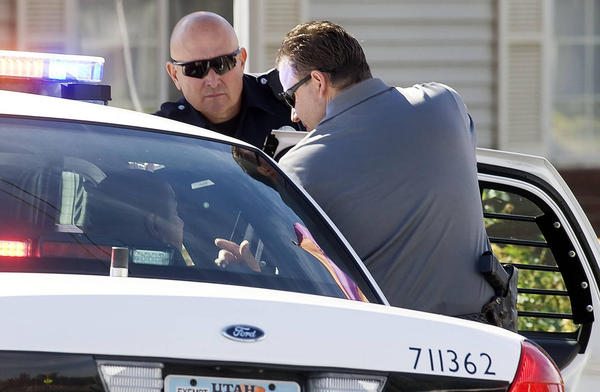
West Valley City has been under pressure for its delay in producing any kind of report of the incident and there have been several protests demanding action. Salt Lake County Prosecutor Simm Gill has also come under pressure to take action to force West Valley to come forward with a report. Gill appears to have done so and just last night there have been some interesting developments.
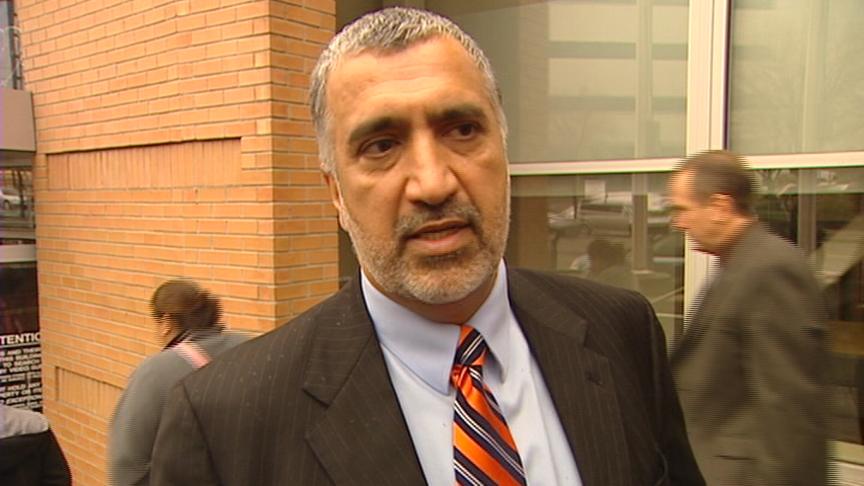
Gill announced yesterday that his office was dismissing 19 cases in which his office concluded that there was no longer a “credible” evidence to obtain a conviction. Most were drug possession cases involving on particular West Valley City narcotics officer. Gill did not disclose his name but it’s being reported that the officer involved in those cases is Shawn Cowley who has worked with West Valley City Police for several years or more. The 19 cases to be dismissed are in different stages of the investigation and some go back several years and all were cases in which Cowley was the arresting officer.
To West Valley City’s credit, to avoid an appearance of conflict, they asked Salt Lake City Police to investigate the matter and it is Salt Lake City that has yet to produce the report. It’s now much easier to understand why this investigation has been slow. A review of the players in this drama makes it apparent that this whole thing is likely to get very complicated–and very interesting to follow.
No charges have been brought against Shawn Cowley but I would not be surprised to see charges in the near future. That D.A. Simm Gill has started dismissing cases involving this particular officer suggests he is clearing the way to file criminal charges against Cowley.
To the best of my knowledge, Danielle Willard’s family has not brought any kind of civil claim for the death of Danielle but it looks like one is likely. They have retained the services of L.A. attorney Mark Geragos who has represented Michael Jackson, Winona Ryder and Scott Peterson. Some may criticize the family for bringing a civil claim but it should be understood that civil rights actions have an important place in ensuring Constitutional rights are respected. The family will have four years within which to bring a federal civil rights claim under 42 United States Code Section 1983. If they want to bring any state claims, Mr. Geragos will have to file a notice of claim within six months of Danielle’s death to preserve the state causes of action.
The plot has thickened with the release of a letter that was sent by Mark Geragos’s office to the West Valley Police Chief demanding records related to the death of Danielle Willard. Evidently, his initial request went unfulfilled. Most interesting is that the letter demands release of Danielle’s personal property and her car. Geragos warned the chief not to destroy the property, including Danielle’s two cell phones, because it will be further evidence of a “department-wide cover-up.”
Here is where it gets good. Geragos writes in the letter, “as you’re aware a ‘mysterious’ fire erupted destroying the surveillance video which would have otherwise captured the incident leading to Ms. Willard’s death…We demand you preserve all evidence…”
Below are photos taken at the scene of Danielle’s car with a red SUV parked behind it.
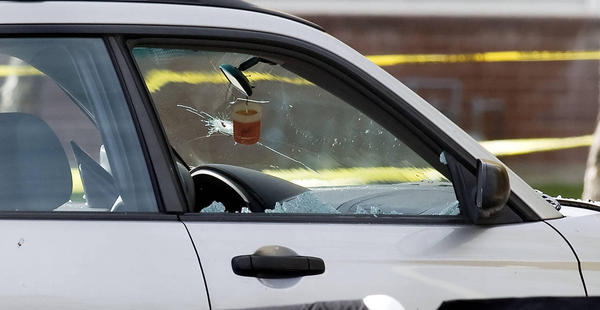
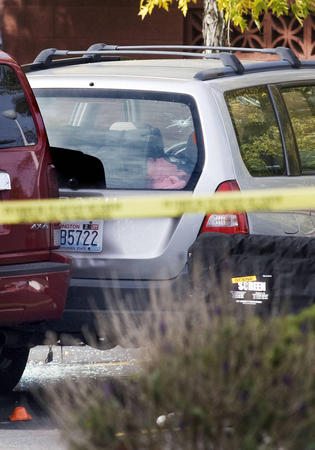
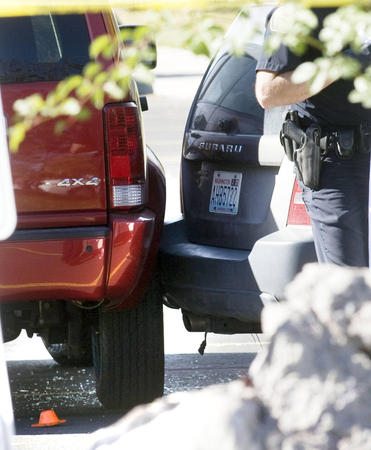
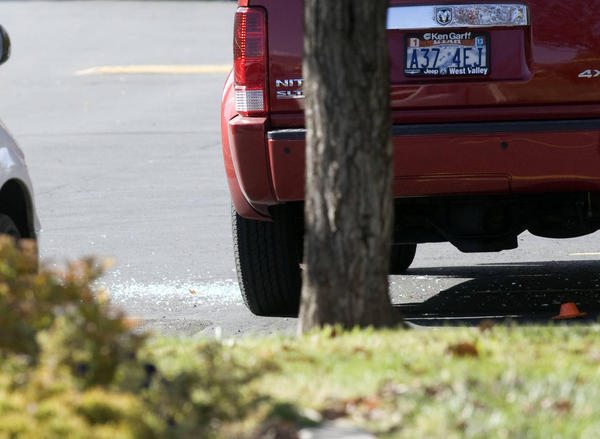
If you’ve been charged with a weapons crime in Utah, contact a Salt Lake City weapons charges defense attorney for a free consultation.







